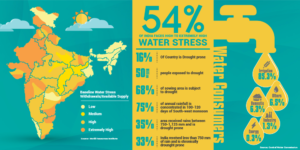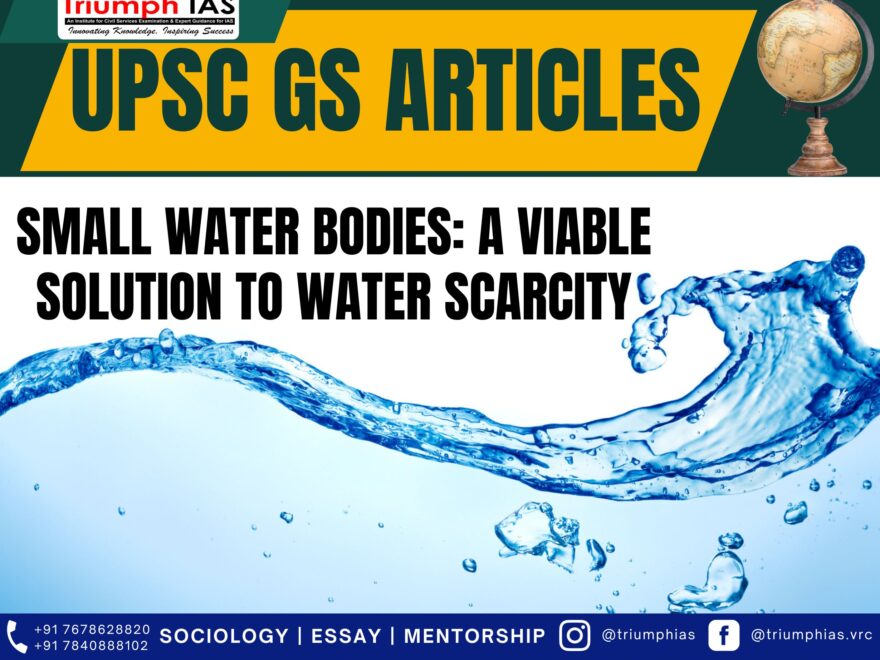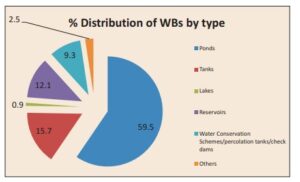Small Water Bodies: A Viable Solution to Water Scarcity
(Relevant for General Studies Paper | Environment | Prelims/Mains)

Small Water Bodies: A Viable Solution to Water Scarcity
According to the United Nations, in the early to mid-2010s, 1.9 billion people, constituting a significant portion of the global population, resided in areas severely lacking in water resources. However, projections indicate that this number will surge to 2.7-3.2 billion people by the year 2050.
The Water and Related Statistics (2021), as presented by the Central Water Commission (CWC) of India, highlight that by 2025, one in every three individuals will find themselves in an area grappling with water scarcity.
Regrettably, the small water bodies such as tanks, which have historically supported both agriculture and domestic water requirements in India, are rapidly disappearing. Consequently, there exists a pressing need to enhance water supply wherever feasible to avert the impending water crisis.
Benefits Derived from Small Water Bodies
- Easy Access to Water: Small water bodies (SWBs) can facilitate convenient access to water for various purposes such as domestic needs, animal husbandry, drinking water, and agriculture, especially in rural areas. This has the potential to enhance water security and alleviate the burden of water collection for households. SWBs are strategically positioned in every village, minimizing the distance women need to traverse to fetch water for their drinking requirements.
- Low Maintenance Cost: In comparison to large dams and reservoirs, the construction and maintenance of SWBs are relatively cost-effective. This affordability makes them an appealing choice for small-scale water storage and management.
- Beneficial for Farmers: SWBs serve as valuable resources for irrigation and aquaculture, ensuring a dependable water source for farming activities. This can contribute to increased crop yields, supporting the livelihoods of farmers. The effective distribution of water without conflicts aids in poverty reduction among small and marginal farmers.
- Assistance in Groundwater Recharge: SWBs play a role in recharging groundwater resources, particularly in areas facing concerns of groundwater depletion. By capturing and storing rainwater, SWBs contribute to replenishing groundwater aquifers, ultimately enhancing overall water availability.
- Biodiversity: Small water bodies offer essential support to a diverse array of plant and animal species, including many rare and endangered ones. They serve as vital habitats and breeding grounds for aquatic and semi-aquatic organisms such as fish, amphibians, reptiles, and birds.
- Water Quality: Small water bodies play a role in enhancing water quality by acting as natural filters. They effectively remove pollutants and sediment from runoff water before it enters larger water bodies. Additionally, they contribute to groundwater recharge and help maintain water levels during droughts.
- Flood Control: Small water bodies play a significant role in mitigating the risk of flooding. By capturing and storing excess water during heavy rainfall, they gradually release it over time, reducing the likelihood of floods.
Continuous Encroachment on Catchment Areas:
- Small water bodies, including lakes, ponds, and streams, face persistent threats due to encroachment on their catchment areas.
- As urbanization continues to expand, individuals are constructing residential homes, commercial buildings, and other infrastructure in and around the catchment areas of these water bodies.
- This trend can result in the destruction of natural vegetation, soil erosion, and pollution of the water body itself.
- The urban sprawl witnessed since the 1990s has significantly impacted small water bodies, transforming many of them into dumping grounds.
- The 16th report of the Standing Committee on Water Resources (2012-13) emphasized that state agencies were themselves responsible for encroaching upon most of the water bodies in the country.
- According to the same committee, about one million hectares of irrigation potential were lost due to encroachment and other reasons.
Lack of Annual Maintenance: Small water bodies necessitate regular maintenance to ensure their health and functionality. However, due to limited resources, these bodies often suffer neglect, leading to deterioration. The absence of maintenance can result in the accumulation of sediment, debris, and pollutants, causing poor water quality and even the complete drying up of the water body.
Pollution: Small water bodies are frequently subjected to pollution from diverse sources, including agricultural runoff, sewage, industrial waste, and urban development. Pollution can give rise to various ecological issues, such as eutrophication, algal blooms, and fish kills.
Habitat Loss: Small water bodies are frequently at risk of habitat loss and fragmentation due to changes in land use, such as urbanization, deforestation, and agricultural intensification. This can contribute to declines in biodiversity and ecological functioning.
Invasive Species: Small water bodies can be susceptible to invasion by non-native species, which may outcompete native species and disrupt ecological processes. Invasive species can also lead to declines in water and habitat quality.
Climate Change: Small water bodies are also influenced by climate change, leading to alterations in water availability, temperature, and quality. Climate change can exacerbate the impacts of other stressors, such as pollution and habitat loss.
Overuse and Exploitation: Small water bodies may face overuse and exploitation for various purposes, including irrigation, drinking water, recreation, and fisheries. Overuse can result in the depletion of water resources, deterioration of water quality, and declines in biodiversity.
What can be done to rejuvenate small water bodies
- Strong Legislation is Needed: Given the continual rise in encroachments, there is an urgent need for robust legislation to classify encroachment on water bodies as a cognizable offense. In 2014, the Madras High Court decreed that no approval should be granted for building plans or layouts on lands situated along Streams, Water Bodies, and Wetlands (SWBs).
- Creating a Separate Ministry for Small Water Bodies: Acknowledging the deteriorating state of SWBs, it is imperative to establish a dedicated Ministry for Small Water Bodies, equipped with sufficient funding for periodic repair and rehabilitation works. The active involvement of farmers, who are the primary beneficiaries of SWBs, is crucial for enhancing the performance of these time-honored oases.
- Setting up a Tank Users Organization: Farmers should voluntarily collaborate to establish a tank users’ organization and take on the responsibility of repairing SWBs, following the precedent set by the age-old Kudimaramathu system. Corporates, utilizing water for various purposes, should be encouraged to contribute to the repair and renovation of SWBs through Corporate Social Responsibility initiatives.
- Avoid Contamination: Small water bodies face vulnerability to pollution from runoff originating from agricultural fields, industrial activities, and residential areas. To safeguard them, it is imperative to prevent the discharge of harmful chemicals and wastes into water bodies.
- Preserving the Surrounding Land: The well-being of small water bodies is intricately linked to the health of the surrounding land. Shielding the surrounding land from development, deforestation, and other activities that induce soil erosion can prevent sedimentation and nutrient pollution in the water.
- Control Invasive Species: Invasive species, including non-native plants and animals, have the potential to disrupt the ecological balance of small water bodies. Implementing control measures is essential to prevent their introduction and spread.
- Raising Awareness: Promoting public awareness about the significance of small water bodies is crucial for garnering support for their protection. This can involve organizing community events, disseminating educational materials, and engaging with local stakeholders.
Reference: The Hindu
Related Blogs…
 |
 |
Frequently Asked Questions:
Q1: Explain the role of small water bodies in combating water scarcity and supporting agricultural activities in rural areas.
Answer: Small water bodies, such as tanks, ponds, and streams, play a critical role in battling water scarcity by providing easily accessible water for domestic use, animal husbandry, and agricultural activities in rural areas. They assist in groundwater recharge, ensure a consistent water supply for irrigation, support aquaculture, and potentially enhance crop yields, thereby underpinning the livelihoods of farmers and aiding in poverty reduction.
Q2: Describe the challenges faced by small water bodies in the context of urbanization and lack of maintenance.
Answer: Small water bodies are confronted with myriad challenges, notably encroachment on their catchment areas due to burgeoning urbanization, which can lead to habitat destruction, soil erosion, and pollution. Moreover, they often suffer from a lack of regular maintenance due to constrained resources, resulting in sediment accumulation, pollutant buildup, and, in some cases, complete desiccation, which subsequently impacts their health and functionality.
Q3: What are the potential strategies for rejuvenating and preserving small water bodies in the wake of continuous encroachments and pollution?
Answer: Strategies to rejuvenate and preserve small water bodies encompass the establishment of robust legislation to render encroachment a cognizable offense, the creation of a dedicated Ministry for Small Water Bodies, and the formation of Tank Users Organizations by farmers for overseeing repairs. Corporates can be engaged through CSR initiatives for SWBs’ repair and renovation, while efforts to prevent contamination, preserve surrounding lands, control invasive species, and elevate public awareness are paramount for ensuring their sustained health and vitality.
Q4: How do small water bodies contribute to enhancing biodiversity and maintaining water quality in their locales?
Answer: Small water bodies serve as essential habitats and breeding grounds for a diverse array of organisms, including various plant, fish, amphibian, reptile, and bird species, thereby supporting local biodiversity. Furthermore, they act as natural filters, removing pollutants and sediments from runoff water, contributing to groundwater recharge, maintaining water levels during droughts, and thereby aiding in the upkeep of water quality in their respective environments.
GS Related Practices Questions…
To master these intricacies and fare well in the Sociology Optional Syllabus, aspiring sociologists might benefit from guidance by the Best Sociology Optional Teacher and participation in the Best Sociology Optional Coaching. These avenues provide comprehensive assistance, ensuring a solid understanding of sociology’s diverse methodologies and techniques.
META TAGS:
Water Scarcity, Small Water Bodies, SWBs, Groundwater Recharge, Biodiversity, Water Quality, Flood Control, Encroachment, Pollution, Habitat Loss, Invasive Species, Climate Change, Legislation, Tank Users Organization, Contamination, Corporate Social Responsibility, Kudimaramathu System, Community Involvement, Preservation Strategies, Sustainable Management.

Why Vikash Ranjan’s Classes for Sociology?
Proper guidance and assistance are required to learn the skill of interlinking current happenings with the conventional topics. VIKASH RANJAN SIR at TRIUMPH IAS guides students according to the Recent Trends of UPSC, making him the Best Sociology Teacher for Sociology Optional UPSC.
At Triumph IAS, the Best Sociology Optional Coaching platform, we not only provide the best study material and applied classes for Sociology for IAS but also conduct regular assignments and class tests to assess candidates’ writing skills and understanding of the subject.
Choose The Best Sociology Optional Teacher for IAS Preparation?
At the beginning of the journey for Civil Services Examination preparation, many students face a pivotal decision – selecting their optional subject. Questions such as “which optional subject is the best?” and “which optional subject is the most scoring?” frequently come to mind. Choosing the right optional subject, like choosing the best sociology optional teacher, is a subjective yet vital step that requires a thoughtful decision based on facts. A misstep in this crucial decision can indeed prove disastrous.
Ever since the exam pattern was revamped in 2013, the UPSC has eliminated the need for a second optional subject. Now, candidates have to choose only one optional subject for the UPSC Mains, which has two papers of 250 marks each. One of the compelling choices for many has been the sociology optional. However, it’s strongly advised to decide on your optional subject for mains well ahead of time to get sufficient time to complete the syllabus. After all, most students score similarly in General Studies Papers; it’s the score in the optional subject & essay that contributes significantly to the final selection.
“A sound strategy does not rely solely on the popular
Opinion of toppers or famous YouTubers cum teachers.”
It requires understanding one’s ability, interest, and the relevance of the subject, not just for the exam but also for life in general. Hence, when selecting the best sociology teacher, one must consider the usefulness of sociology optional coaching in General Studies, Essay, and Personality Test.
The choice of the optional subject should be based on objective criteria, such as the nature, scope, and size of the syllabus, uniformity and stability in the question pattern, relevance of the syllabic content in daily life in society, and the availability of study material and guidance. For example, choosing the best sociology optional coaching can ensure access to top-quality study materials and experienced teachers. Always remember, the approach of the UPSC optional subject differs from your academic studies of subjects. Therefore, before settling for sociology optional, you need to analyze the syllabus, previous years’ pattern, subject requirements (be it ideal, visionary, numerical, conceptual theoretical), and your comfort level with the subject.
This decision marks a critical point in your UPSC – CSE journey, potentially determining your success in a career in IAS/Civil Services. Therefore, it’s crucial to choose wisely, whether it’s the optional subject or the best sociology optional teacher. Always base your decision on accurate facts, and never let your emotional biases guide your choices. After all, the search for the best sociology optional coaching is about finding the perfect fit for your unique academic needs and aspirations.
To master these intricacies and fare well in the Sociology Optional Syllabus, aspiring sociologists might benefit from guidance by the Best Sociology Optional Teacher and participation in the Best Sociology Optional Coaching. These avenues provide comprehensive assistance, ensuring a solid understanding of sociology’s diverse methodologies and techniques. Sociology, Social theory, Best Sociology Optional Teacher, Best Sociology Optional Coaching, Sociology Optional Syllabus.
Best Sociology Optional Teacher, Sociology Syllabus, Sociology Optional, Sociology Optional Coaching, Best Sociology Optional Coaching, Best Sociology Teacher, Sociology Course, Sociology Teacher, Sociology Foundation, Sociology Foundation Course, Sociology Optional UPSC, Sociology for IAS,
Follow us :
🔎 https://www.instagram.com/triumphias
🔎https://www.youtube.com/c/TriumphIAS
🔎https://t.me/VikashRanjanSociology
Find More Blogs…
| Compare and contrast Karl Marx’s and Max weber’s | Karl Marx- Historical Materialism |
| Talcott Parsons : Social system | Scope of the subject and comparison with other social sciences |





